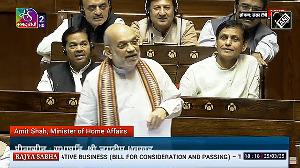Unlike Fakhruddin Ali Ahmed and Giani Zail Singh, one hopes Pranab Mukherjee will do a better job when asked to 'preserve, protect and defend the Constitution', says T V R Shenoy.
Pranab Mukherjee is following in the footsteps of Fakhruddin Ali Ahmed and Giani Zail Singh. While several Presidents had served as ministers earlier in their careers, they were the only two to move directly from the Cabinet Room to Rashtrapati Bhavan -- and theirs were two of the most controversial tenures in the highest Constitutional post.
Fakhruddin Ali Ahmed was perhaps the worst President ever to hold that office. Thirty-seven years ago, on or around midnight of June 25, 1977, Fakhruddin Ali Ahmed was woken up by a messenger sent by then prime minister Indira Gandhi.
He was told that there was an 'imminent danger to the security of India being threatened by internal disturbances', so grave that it could be settled only by declaring an Emergency. Fakhruddin Ali Ahmed signed on the dotted line without any qualms.
The President's oath of office requires him or her to 'preserve, protect and defend the Constitution'. Fakhruddin Ali Ahmed, essentially, chose to preserve, protect and defend Indira Gandhi's rule. India was a dictatorship for nineteen dreadful months, and the poison has not yet been drained from our system.
Giani Zail Singh broke the accepted precedent when he made Rajiv Gandhi the prime minister of India in 1984. The tradition had been set by Dr S Radhakrishnan, who had to cope with the deaths in office of Jawaharlal Nehru and Lal Bahadur Shastri.
In 1964 and 1966 the President invited the senior member of the Cabinet to form a caretaker government -- Gulzarilal Nanda on both occasions -- so that the ruling party would have the time to elect a new leader.
Giani Zail Singh -- a man who had once proclaimed, 'If she (Indira Gandhi) hands me a broom I shall start sweeping the floor' -- swept aside the Radhakrishnan convention, and appointed a prime minister who had never served as a minister at any level. The MPs were, in effect, presented with a fait accompli.
The senior minister in Indira Gandhi's Cabinet, who should have taken over as the interim chief executive, was Pranab Mukherjee. He had set off on the wrong foot with Rajiv Gandhi by citing the case of Gulzarilal Nanda, which the somewhat paranoid Nehru-Gandhi scion interpreted as a challenge.
Pranab Mukherjee was driven into the wilderness for the length of Rajiv Gandhi's reign, forming his own party, the Rashtriya Samajwadi Congress in 1986.
That Samajwadi of 1986 probably owes his elevation to Rashtrapati Bhavan thanks to the Samajwadi Party of today -- another of destiny's little jokes.
It is no secret that the Nehru-Gandhi dynasty preferred Vice-President Mohammad Hamid Ansari for the Presidency. There were two reasons. First, Pranab Mukherjee was the one who actually handled the nuts and bolts of governance, not poor Dr Manmohan Singh. Second, Sonia Gandhi still does not trust Pranab Mukherjee.
Pranab Mukherjee's rebellion against Rajiv Gandhi has been mentioned above, but this was not the first time that he had opposed the Congress's ruling dynasty. He had, in fact, also acted against Indira Gandhi herself.
My first meeting with Pranab Mukherjee was in 1969, in Midnapore in West Bengal, where he was acting as the election agent to, of all people, V K Krishna Menon. The tale of how that stormy petrel of Indian politics -- a Malayali at that! -- ended up fighting from a constituency in West Bengal is a saga in itself.
Krishna Menon had fought, and won, from Bombay North in 1957 and 1962. That constituency was redrawn, and Krishna Menon stood, as an Independent, from Bombay North East in the 1967 general election.
Krishna Menon was defeated by the Congress candidate, S G Barve, by the fairly slim margin of 13,169 votes. No Congressman wants to admit it today, but their candidate won thanks to the active support of the Shiv Sena.
S G Barve died shortly after, and the Congress gave the ticket to Tara Govind Sapre. (If memory serves me, she was the former MP's sister.) Krishna Menon stood again, and was again defeated thanks to the Shiv Sena opposing the 'outsider'.
In 1969 another by-election became necessary when S N Maity, the sitting MP for Midnapore, died. By this time Ajoy Mukherjee had split the Congress in West Bengal, creating the Bangla Congress, which joined hands with the CPI-M to form United Front ministries.
The best remembered fact about theses coalition was that Chief Minister Ajoy Mukherjee was once moved to sit in a dharna outside Writers' Building in Kolkata to protest against his own government.
Against the backdrop of such lunatic chaos it felt completely natural that a regional party calling itself the 'Bangla' Congress would choose a Malayali as its candidate. At any rate, Pranab Mukherjee, who was then in the Bangla Congress, was deputed to assist Krishna Menon.
The results speak for themselves -- Krishna Menon beat the Congress's K D Roy by 187,850 votes to Roy's 81,083, a margin of well over 100,000 votes.
Indira Gandhi, unlike the pygmies that followed her, recognised talent when she saw it, and soon brought Pranab Mukherjee into her own camp. The Iron Lady's son and daughter-in-law, however, could see only a history of 'ambition' and 'disloyalty'.
Rajiv Gandhi had the luxury of doing without Pranab Mukherjee after winning a landslide mandate in the 1984 general election; Sonia Gandhi knew that a Congress government could not work without Pranab Mukherjee's skills in the fractured Lok Sabha of 2004, but she could -- and did -- deny him the prime ministership.
Sonia Gandhi had already seen just how formidable a rival the dynasty faced when even a lacklustre politician became prime minister -- precisely what happened in the P V Narasimha Rao era.
In 2004 the Nehru-Gandhis opted for a non-politician, someone that had never won as much as a Panchayat seat, namely Dr Manmohan Singh.
It was Pranab Mukherjee -- in his stint as Indira Gandhi's finance minister -- that had signed the letter appointing Dr Manmohan Singh as Governor of the the Reserve Bank of India.
It must have been galling to see his former underling elevated to the prime ministership, but there were no public remonstrations. Indeed, whether as defence minister, external affairs minister, or finance minister, he became the indispensable man in the UPA government, heading as many as 53 groups of ministers at one point. (That number might even have increased.)
But the Nehru-Gandhi dynasty's lingering suspicions about Pranab Mukherjee's 'loyalty' never quite evaporated, and it took the combined efforts of Mamata Banerjee and Mulayam Singh Yadav to force Sonia Gandhi's hand. (The Trinamool Congress and the Samajwadi Party were, of course, acting in their own interests, not those of Pranab Mukherjee.)
This history -- Pranab Mukherjee's flashes of rebellion, any bitterness about the Nehru-Gandhis' reluctance to trust him, however briefly, with prime ministership -- offer some hope that the 13th President will not follow in the footsteps of Fakhruddin Ali Ahmed and Giani Zail Singh. And that he will do a better job when asked to 'preserve, protect and defend the Constitution' should the challenge arise.
For more columns by Mr T V R Shenoy, please click here.







 © 2025
© 2025